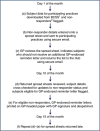GP participation in increasing uptake in a national bowel cancer screening programme: the PEARL project
- PMID: 28524157
- PMCID: PMC5518858
- DOI: 10.1038/bjc.2017.129
GP participation in increasing uptake in a national bowel cancer screening programme: the PEARL project
Abstract
Background: The NHS Bowel Cancer Screening Programme (BCSP) in England does not involve general practitioners (GPs). Uptake is ∼58%. The Practice Endorsed Additional Reminder Letter (PEARL) study piloted a GP-endorsed reminder letter.
Methods: General practices in Wessex with uptake <55% (prevalent invitations) were invited to participate. Subjects who had been invited for screening, sent a standard 28-day BCSP reminder letter but had not returned a test kit within 30 days of the standard reminder were sent a second reminder letter bearing the GP's letterhead and signature. Uptake was compared between PEARL and non-PEARL practices by standardised uptake ratio (standardised for prior prevalent uptake and other confounders). In addition, 25 non-PEARL practices were matched with PEARL practices for prior prevalent uptake and number of invitees.
Results: Twenty-five practices agreed to participate. A total of 3149 GP-endorsed reminders were sent. Uptake in the PEARL practices was 54% compared with 51% in the matched-control practices. The adjusted RR for uptake was 1.08 (95% CI: 1.05, 1.11, P<0.001) for all invitees and 2.18 (1.79, 2.66, P<0.001) for invitees who had not returned a kit following the standard reminder.
Conclusions: The GP-endorsed reminder was associated with significantly increased uptake among subjects not responding to the standard reminder letter.
Conflict of interest statement
The authors declare no conflict of interest.
Figures
References
-
- Allgood PC, Maxwell AJ, Hudson S, Offman J, Hutchison G, Beattie C, Tuano-Donnelly R, Threlfall A, Summersgill T, Bellis L, Robinson C, Heaton S, Patnick J, Duffy SW (2016) A randomised trial of the effect of postal reminders on attendance for breast screening. Br J Cancer 114: 171–176. - PMC - PubMed
-
- Cole SR, Young GP, Byrne D, Guy JR, Morcom J (2002) Participation in screening for colorectal cancer based on a faecal occult blood test is improved by endorsement by the primary care practitioner. J Med Screen 9: 147–152. - PubMed
-
- Cummings P (2009) Methods for estimating adjusted risk ratios. Stata J 9: 175–196.
MeSH terms
LinkOut - more resources
Full Text Sources
Other Literature Sources
Medical
Molecular Biology Databases


